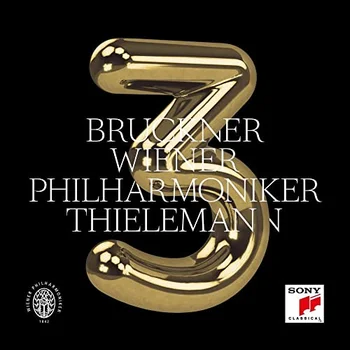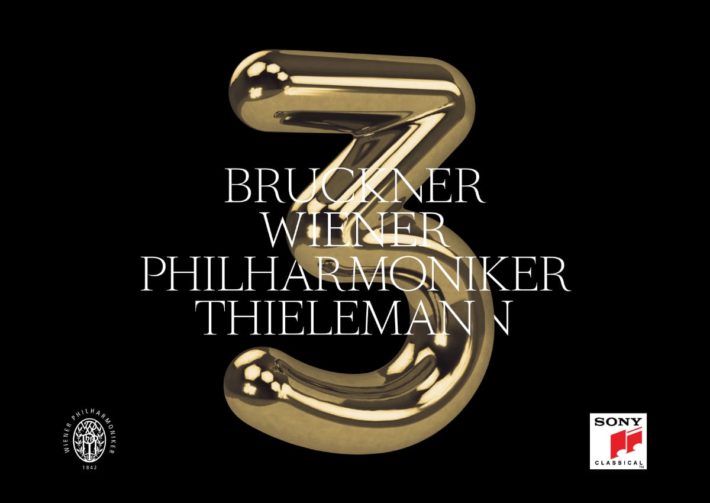There is probably no other orchestra more grounded in the music of Anton Bruckner than the Vienna Philharmonic. With every eminent conductor who has directed these monumental symphonic masterpieces, the orchestra moulded and adapted to different approaches. Conductor Christian Thielemann, having complete a cycle on DVD and CD with Staatskapelle Dresden, adds the third symphony to his projected second cycle with the VPO on the Sony label, having already recorded the Eighth (Read our review).

To the newer listener, Bruckner’s symphonies can seem to have monolithic musical structures. Their scales are brutal and almost primitive, needing deep and intrinsic musical insight to illuminate in the best possible light. The arches in the structure are monumental; requiring not only insight, but pacing, shaping and absolute certainty in the direction of the music. More and more I’ve found that the more successful Bruckner interpreters are giving ample space, but not shutting the door completely to ambiguity.
How the listener experiences Bruckner is as personal as the choice of edition for the conductor. Musicologically, there are many varying editions of the different versions of this symphony, which creates a minefield for conductors in choosing the version they consider the most ‘authoritative’. Thielemann in both his Staatskapelle Dresden and Vienna Philharmonic recordings chooses the 1877, “Nowak” edition.
It is immediately obvious that Thielemann believes in this edition. Thielemann does not take as many risks as the Bruckner specialist and scholar Gerd Schaller in either of his very different recordings of the 1874 version (W. Carragan) or 1890 version (T. Raettig). Schaller has varied and strong tempo choices, bringing very different characters to each movement. Thielemann is slightly reserved throughout, avoiding the overly emotional Karajan rendition. He holds the reins tightly and while there are peaks, he doesn’t allow them to overwhelm or flaw the listener. I’ve found this modesty refreshing, allowing the music to be appreciated fully and not be distracted by heavy blows of powerful gestures.
The opening movement has momentum, energy and impetus. Thielemann treats the thematic material gently, shaping it carefully and with reverence. It isn’t treated brutally, but blends into the overall tapestry of sound. The slower second movement has a genuine warmth. Thielemann is not rigid with the pulse, and takes his time on occasions, allowing the music to breathe organically, elongating the phrases or pausing for air when the music commands. The spontaneity and poise, combined with the more relaxed tempo choice, are such that the emotional impact is strong, communicative and meaningful, without being overshadowing.
The repeat of the scherzo is quite literal, maybe more faithful to the classical roots which anchors Bruckner’s music. Bringing a much needed lightness in the ländler-style central trio section, Thielemann finds buoyancy and gentility. The final movement is colored by an onward drive. Each of the sections have distinct characters, from the more rumbustious opening to the more lyrical passages. The movement brings a sufficiently resolute climax to the work, that still preserves the rest of this performance’s refinement. Thielemann does find the contrasts in each movement, which makes this version engaging and animated.
The conviction from the Viennese players to realise the conductor’s vision is flawless. They give Thielemann everything he commands, elegantly shaping and sculpting the bigger structural pillars and bringing crafted nuance and color to the shorter phrases. The sound of the Vienna Philharmonic is nothing less than beautiful, most noticeable in the more complex textures.
Exceptionally clear engineering and superb balancing is an added treat, recorded in the Golden Hall of the Musikverein. The placing of the strings is considered and given ample space, while the lower strings, so vitally important in providing the solid foundations for the harmonic columns, come through clearly throughout. The woodwind and brass of the Vienna Philharmonic have a different, cooler nuance than Karajan’s Berlin version, and ideally complements the aesthetic Thielemann is after. Bruckner aficionados may have their own opinions on the choice of edition and emotional restraint, but this release is an interesting and a satisfactory listen indeed.
Bruckner – Symphony No. 3 (Ed. Nowak)
Vienna Philharmonic Orchestra
Christian Thielemann – Conductor



















